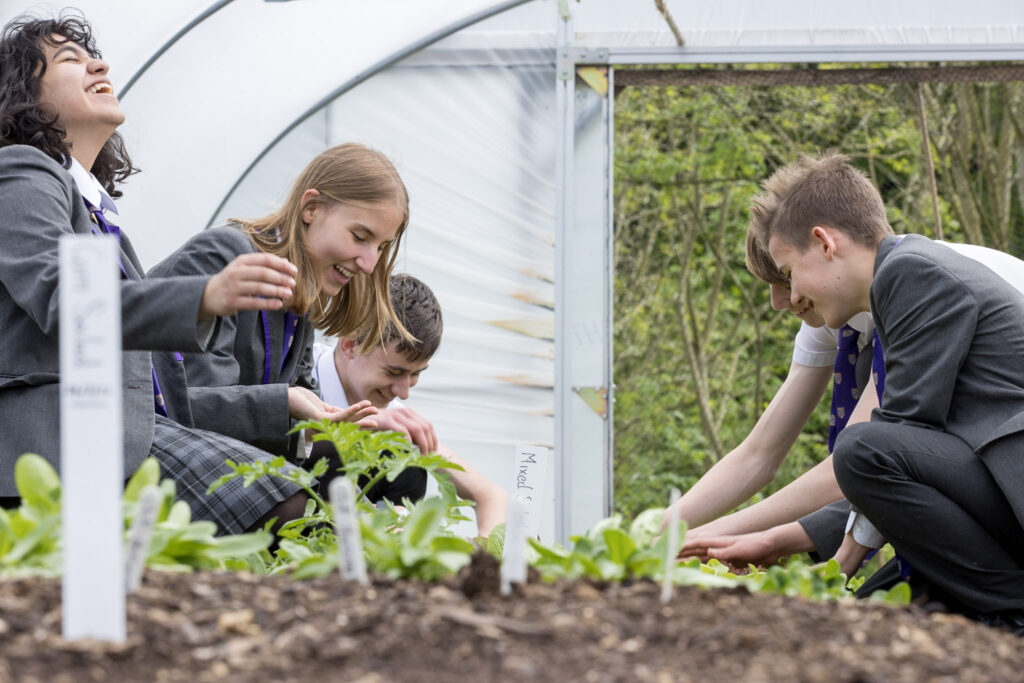Explore the Let’s Go Zero map to see where else teachers, students and school communities are taking action to become zero carbon by 2030.
Let’s Go Zero school action:
Kingsley School Devon, Bideford
With an Earth Centre dedicated to teaching students about sustainability, ecology and environmentalism, Kingsley School Devon are making great steps towards becoming zero carbon. They have been working hard to ensure all aspects of school life are more sustainable, including:
- Replacing old oil-fired boilers with air source heat pumps and installing solar panels
- Repurposing a rugby pitch into a market garden with no-dig, regenerative, permaculture beds
- Planting over a 3000 trees and wildflower meadows on the school grounds
- Conducting energy, biodiversity and carbon audits and converting to a green energy tariff

The teachers and students leading the action:
“If we are going to survive as a human race, we need to be far more sustainable and far more environmentally minded. And if we are thinking about preserving our future, it’s kids who are going to be those change makers and those decision makers.”
Jack Harty, Earth Centre Manager

What are they doing in their school?

Kingsley School Devon have quantified the carbon footprint from both their direct emissions, and their indirect emissions from purchased energy. They have been working with a local partner, the social enterprise Energy 361, which provides them with advice on how to lower emissions and make the school more sustainable. As the old boarding houses are renovated, oil-fired boilers are being replaced with air-source heat pumps, whilst they are currently undergoing a feasibility study for a solar array on site.

After repurposing one of the school’s rugby pitches, there are now nine large, regenerative beds where food is grown. Between planting seasons, the beds are prepared with nutrient rich soil, with the no-dig policy ensuring as much carbon stays in the ground as possible and soil structure isn’t disturbed. The students help to grow the food onsite, and then use it in their Food Tech lessons. A lot of the food grown in the market gardens is also cooked in the school kitchens, providing students with a nutrient-dense diet.

The school has worked successfully with their caterers to make sure that any food coming from offsite is sourced as locally as possible, resulting in their biggest providers all being local. Moving onto their scope three carbon foot printing, which involves procurement, the school are thinking of ways to source supplies sustainably and use suppliers within their county.

Kingsley School is in the middle of transitioning to a local waste management company that operates a zero to landfill scheme and produces electricity from its incinerated waste. All food waste produced by the school is composted on site and used on the no-dig agricultural beds, allowing the students to see and get involved in a circular economy in action. In the future, the school plans to harvest rain water to provide for their ecology zone in an effort to reduce the amount of water coming from taps.

The no-dig regenerative beds in the ecology zone means the maximum amount of nutrients and carbon can be put back into the soil and wildlife can flourish. There are bug hotels and beehives around the school grounds, as well as orchard trees, wildflower meadows and woodlands, all aiming to increase biodiversity. The school have also begun to measure if the carbon and nutrient density within the soil of the regenerated rugby pitch is increasing, and hope to make this a yearly audit process.

Sustainability is fully embedded into the curriculum for both primary and secondary students. Primary students have environmental studies and forest schools as part of their lesson rotations, whilst a new diploma is being written for students in key stage three, focusing on sustainability, environmentalism and ecology. Students are involved in lots of the decision-making processes, such as deciding where solar panels could go on the school grounds. Teachers want students to feel empowered to take climate action, both in school and at home.